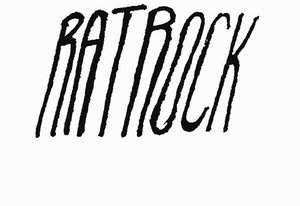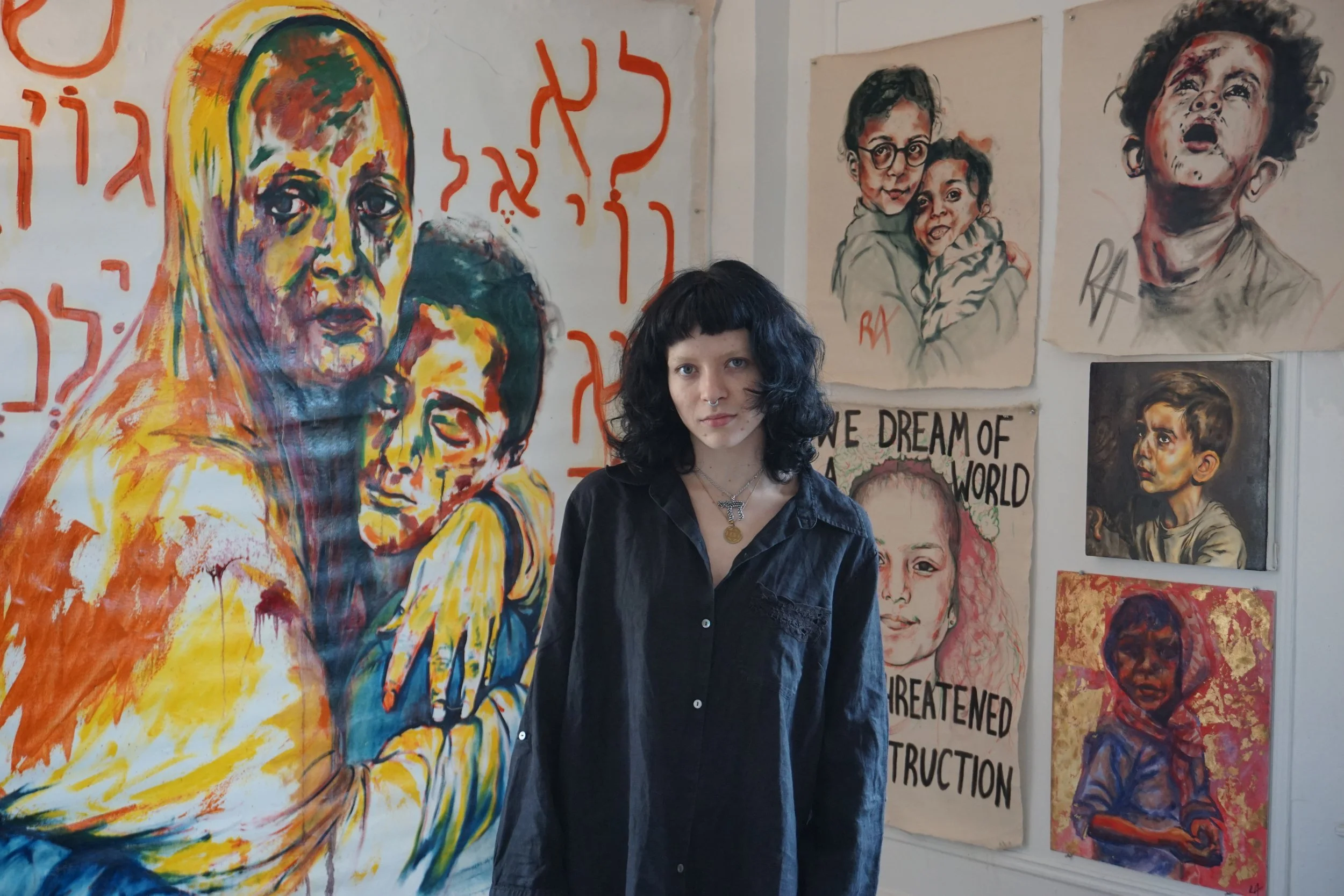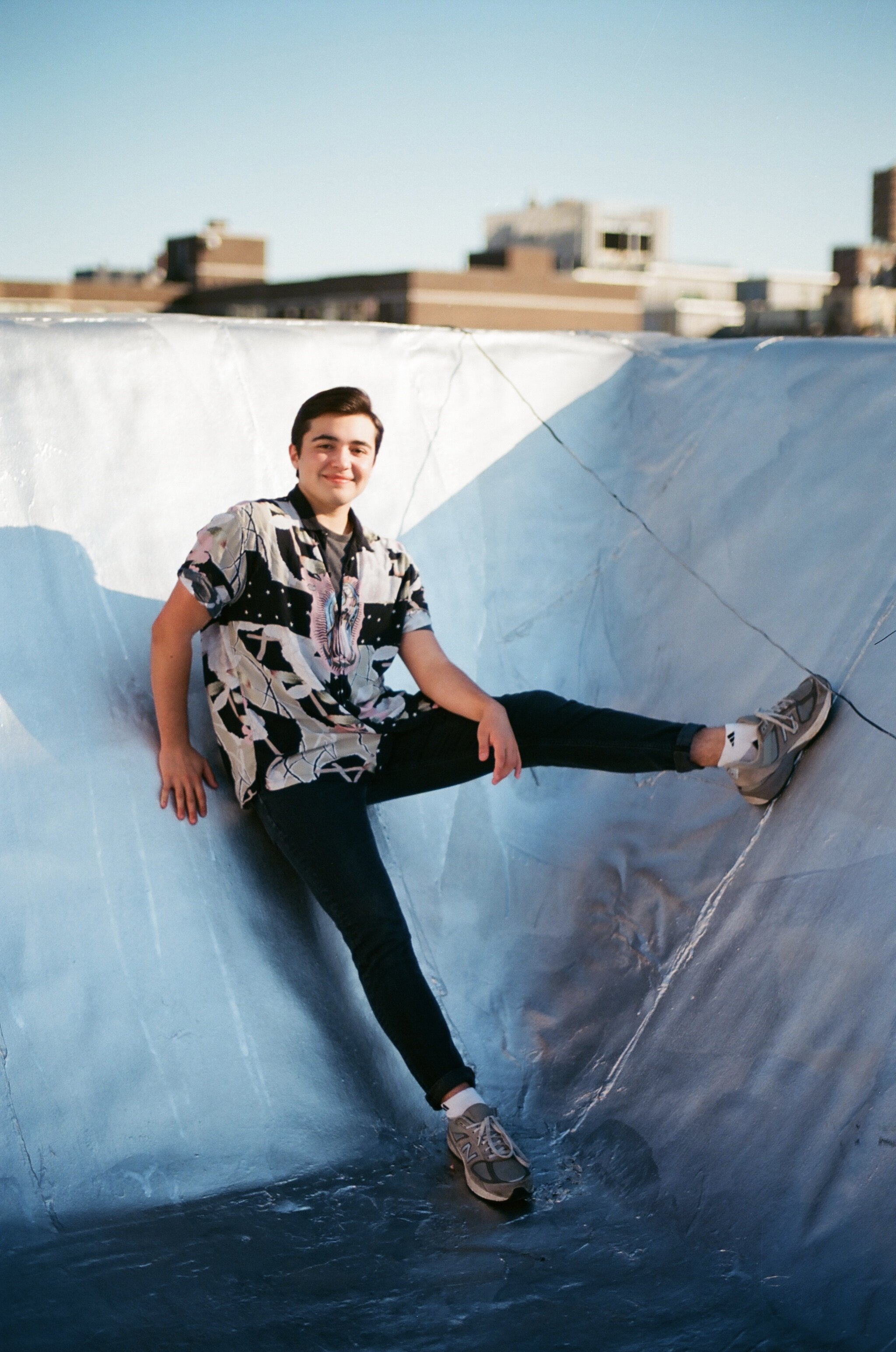
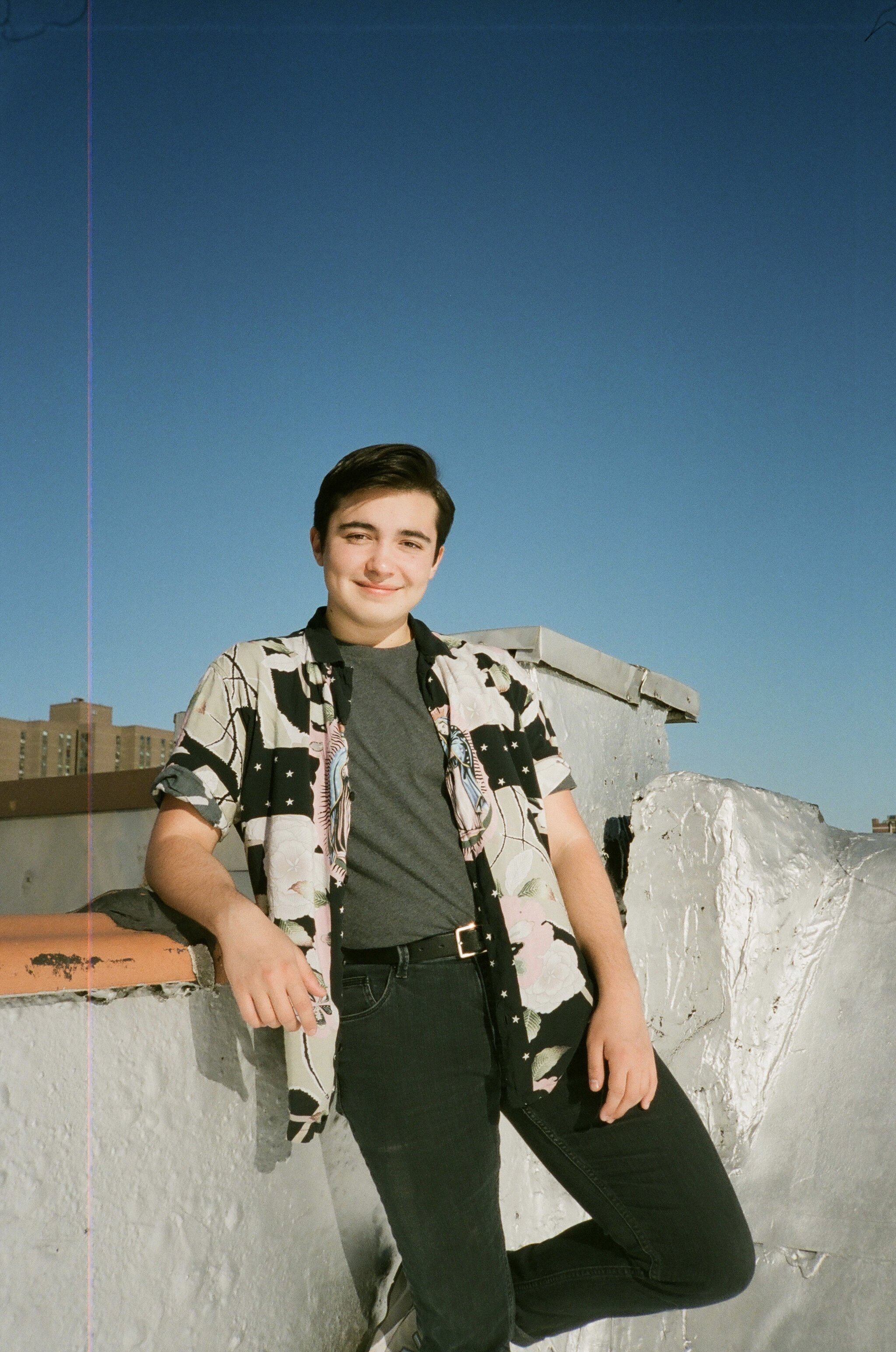
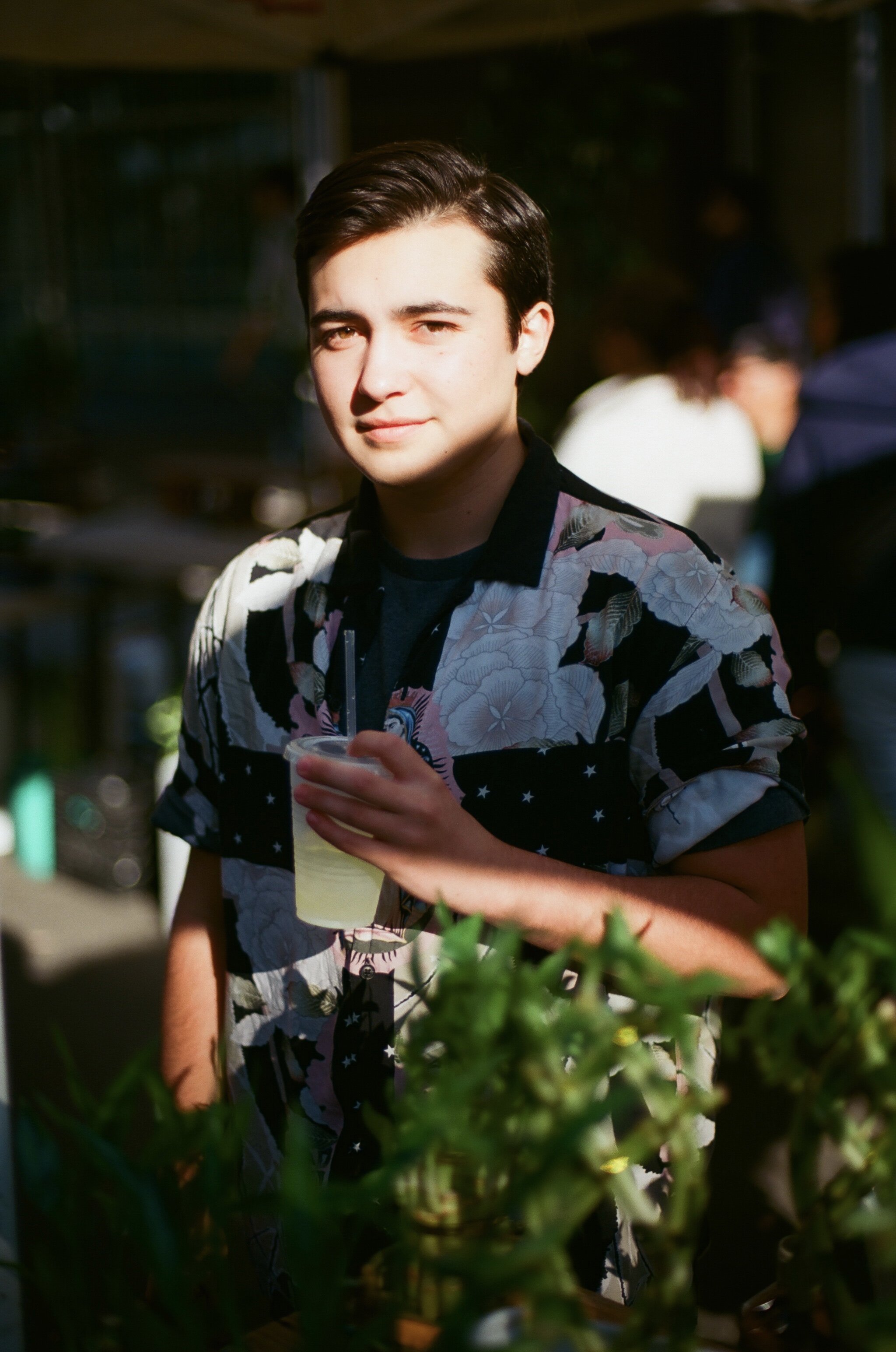
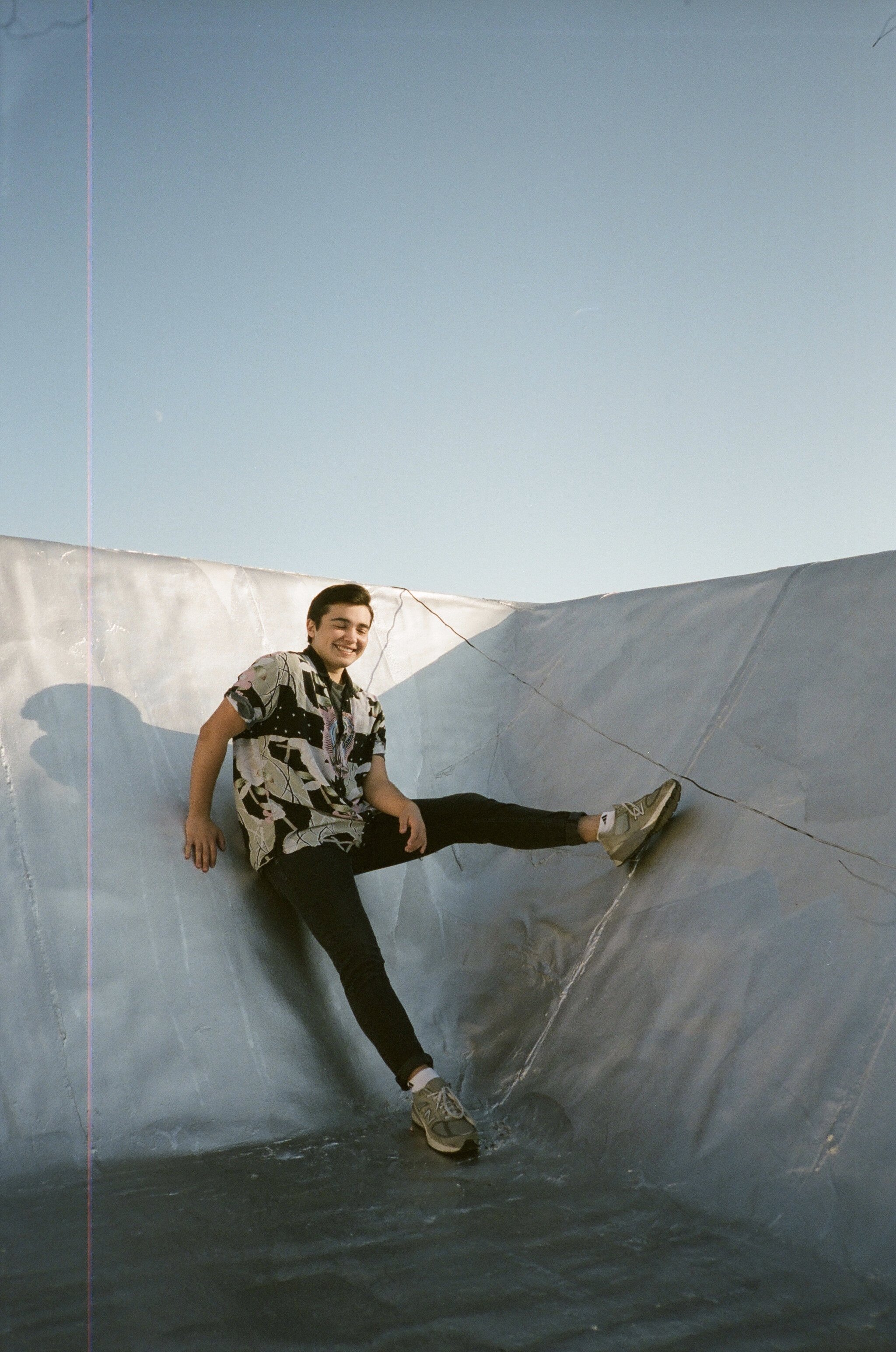
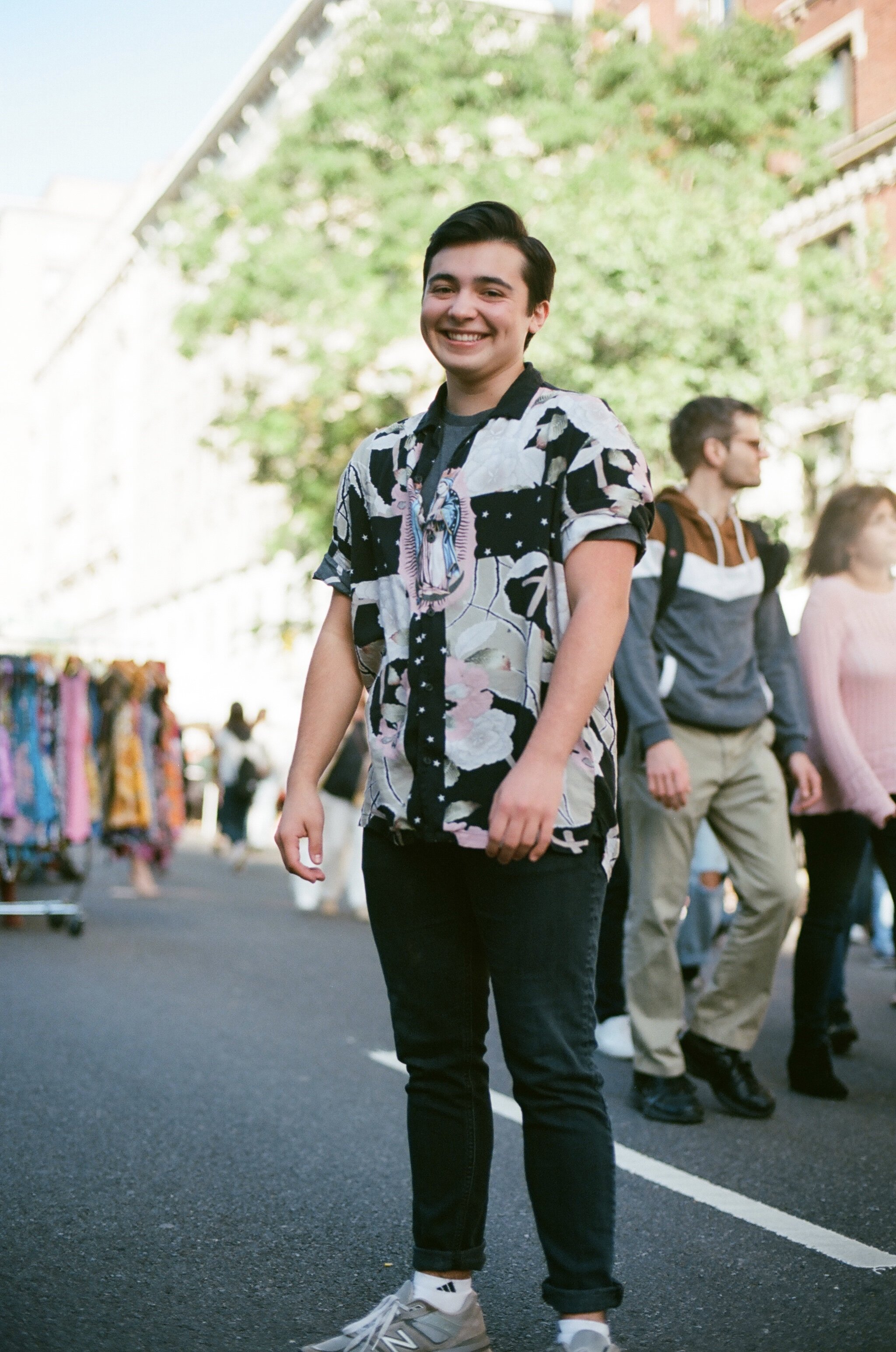
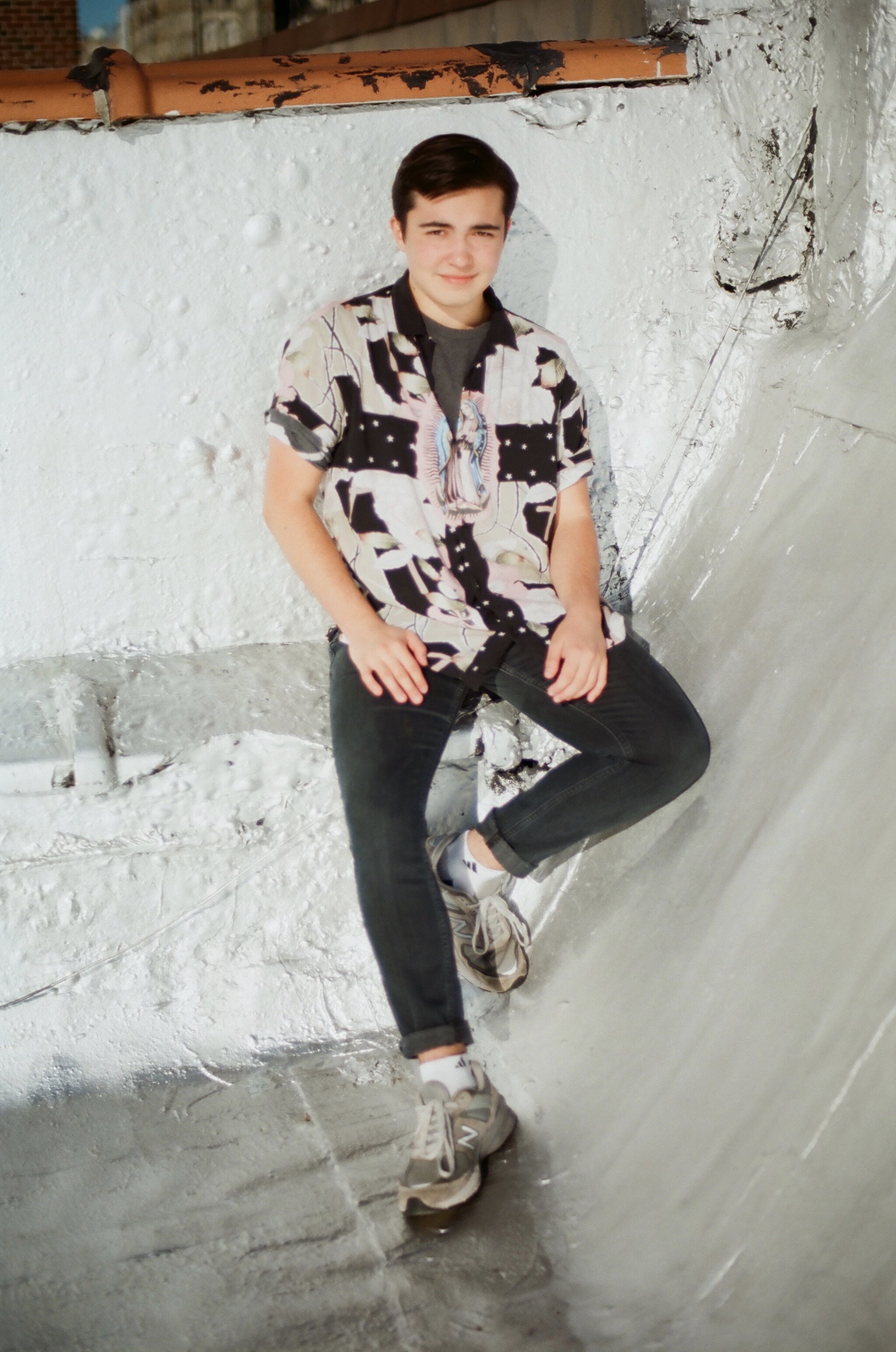
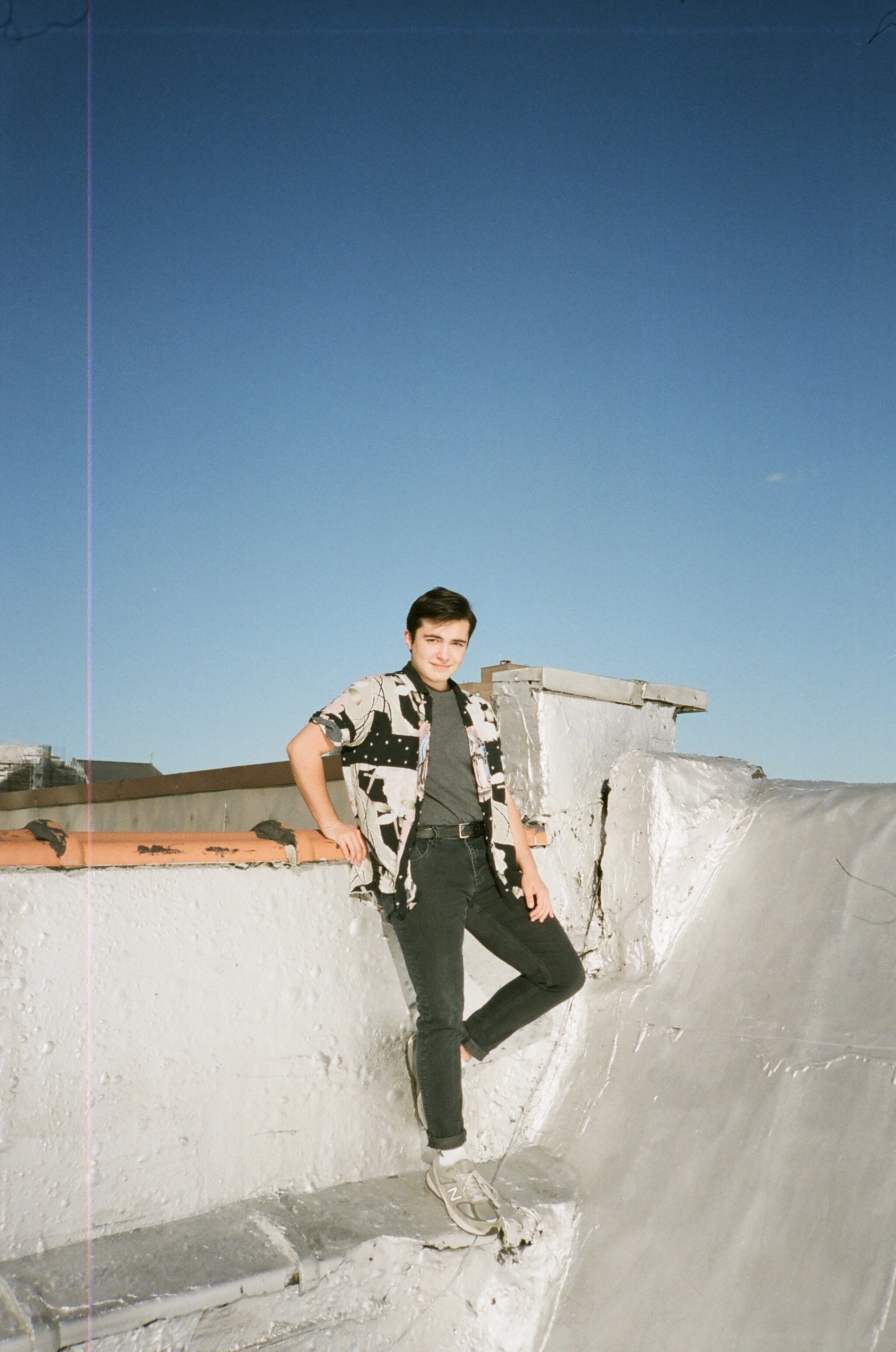
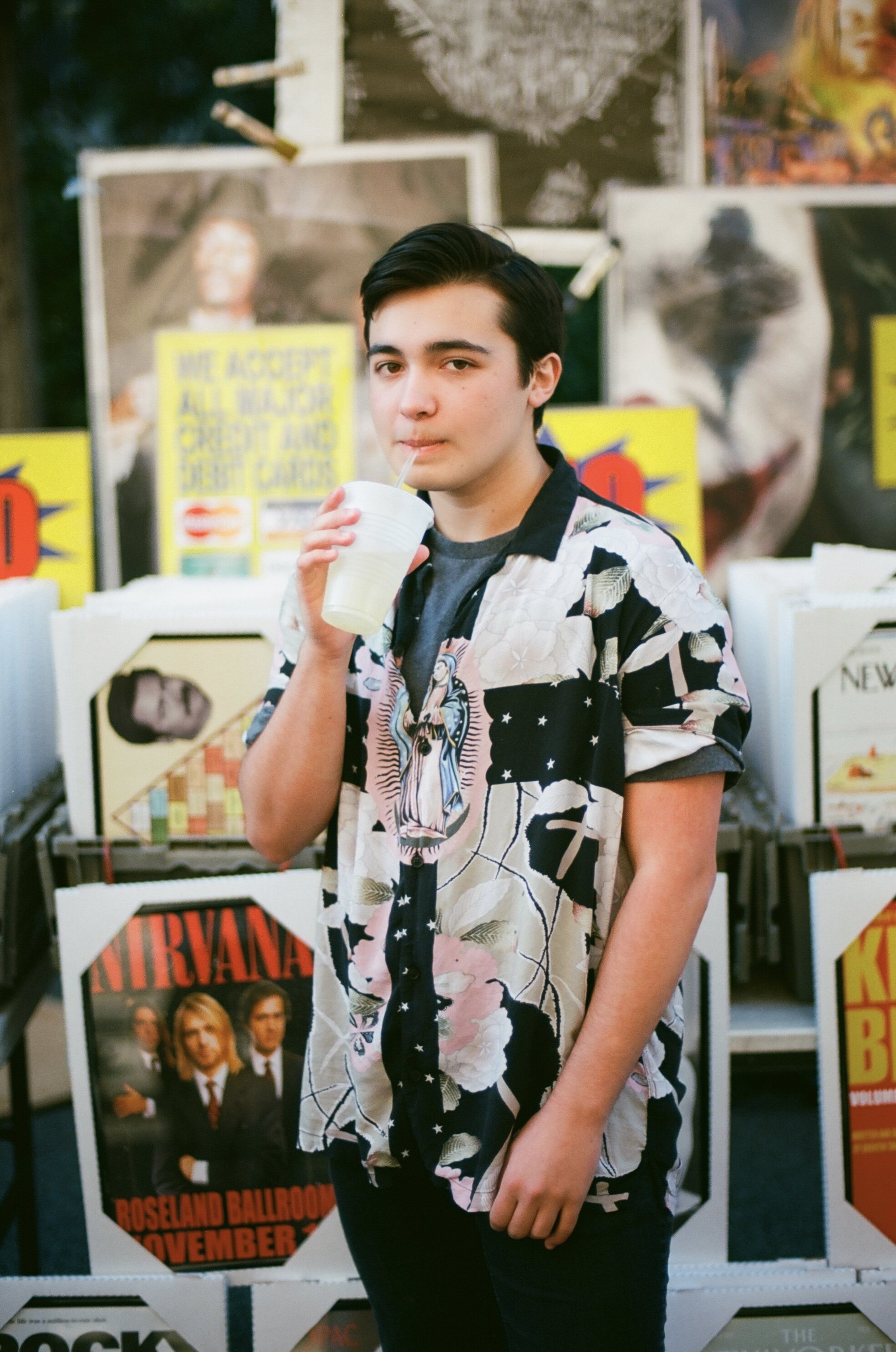
Photographs by Maya Hertz
Interviewed by Isabella Rafky
Tell me a little bit about yourself.
This was definitely the hardest question for me to answer, because I am interested in so many different things. I’m an art history and english major, and other than that I just recently finished up work as a florist and vendor in Abingdon Square, which was a really fun job for me. Previously, I’ve been a bagel store employee — you know, just getting it done. Other than that, it's really hard to say. I feel like I’m coming to grips with the fact that I’m a quiet, but dramatic person. Kind of an oddball; I like going to really weird events, like Pickle Day. I’m from San Diego. I’m a poet and a visual artist.
What motivates you to write poetry and create visual art? Are they different forces of motivation?
They are definitely very different forces for each genre. Visual art, to me, is more performative. I’m really kind of a show-off with my visual art: I’ll put it on my walls, I’ll give it as gifts to friends, I’ll do anything with it. Whereas my poetry, or any of my writing, is definitely more guarded. I’m working on a poetry anthology right now that I’m trying to submit to the APR’s First Book contest — so I’m trying to crank out a piece [each] day.
Where do you get your inspiration from? (i.e., Magic 8 Ball Python coding)
All of my work is just an amalgamation of everything that I’m interested in. Everything that I’ve read — poets like Anne Carson, [writers like] Cormac McCarthy. Movies like “The Matrix” — so many different things. I think mainly what I feel is that everyone in all of these works is trying to get at what forces govern a person’s life — what kind of biological, or technological, or celestial forces? And I am really interested in getting at what those could be.
What celestial forces do you feel get at you?
I don’t know! It’s really hard to say (laughs). I definitely am interested in so many different aspects of different religions and incorporating that into my work — like the idea of reincarnation. I come from a Catholic background, so that does come into my work a bit.
If your final actions were to be a “Choose Your Own Adventure,” like in “Oat Milk Forever,” what would they be?
These are all very hard questions (laughs). I feel that life is essentially like a “Choose Your Own Adventure.” Everything that we do is so dictated by choices, and those choices are influenced by different things. But at the end, it’s your own decision. But if it was like, a final decision, I guess maybe I would publish my work — because I feel like it is really representational of who I am as a person, and it would be a good way to memorialize myself.
How do you best express fragmentation? Do you treat each fragment as a whole, or do the fragments form a whole themselves?
I feel that [fragmentation] is mostly expressed through surrealism as a genre in my writing — because at the root of it, I think feeling disoriented and misrepresented is really reflective of my experience as a minority of any sort. I’m just trying to represent that experience through surrealism as a genre. And to the second question, I feel like each fragment is a whole. I feel that there is a finality to every piece, and it’s hard to put them next to each other if they each have their own circularity to them.
Talk to me more about your surrealism. How did you come to it? Have you always been a surrealist poet? How do you see surrealism in your own work?
I definitely did not start out as a surrealist poet. I started doing open mics in high school, and that sort of work was very activism-based. It was very, like — I don't know what the right word is — but it was very set in stone, very... rebellious. I don’t know if that’s the right word (laughs) but it definitely didn’t have a genre that I can ascribe to it other than performative. And then after that, I started to get into different poets that had worked within surrealism, and I just became completely obsessed with how that genre operated — especially like Césaire. I just found it strangely beautiful, almost like a fever dream. I’m really interested in how [surrealism] works, and how it’s such a unique genre of poetry. I feel like surrealism in art just operates differently than it does in writing. I don’t know if there is anything in particular that caught my eye to it, I just really love it.
Besides fragmentation, what are other themes you touch on in your work, and why? Why does fragmentation call to you?
I think within my work, I’m still trying to figure out a genre that works for me, and I switch very often between different modes, different perspectives — just trying to parse out exactly what I want to do with my work, and where it’s going. That has definitely lent itself to the fragmentation, just due to the experience of writing itself. I think it’s also reflective of where I am as a person right now. I’m on the cusp of being 20; I’m just trying to figure out exactly what I want to do, and I want my work to reflect where I am as a person as well as what I’m interested in thematically. As for different themes, I feel that my work is definitely trying to resist being themed. I don’t know how well it’s doing that — but fragmentation is obviously something that is very identifiable. I’m just trying to create something that anyone can draw out of, whatever they want. There’s this quote by a famous artist that I really like, Fred Tomaselli: “I’m not trying to be anyone’s cop for my artwork.”
I just want my audience to get out of my work what they want to get out of it and if it is like therapy for them to read my work and relate to something that's great! If it’s just reading something that’s aesthetically pleasing that’s also great. I’m not trying to create a universal truth in my work.
Are there any spaces on campus that you go to find inspiration or to be creative?
That’s a hard question, because I run in so many different circles. Freshman year I offhandedly decided to join the marching band, so there’s this kinda offbeat circle I’m a part of—just like, community and friends coming together and making music. I play cowbell. But it’s still just [about] relating to other people. Other than that, I’ve been really trying to figure out where those spaces are. Artistically, I’m not really involved very much in any kind of scene. So I often end up wandering with my friends through galleries. There isn’t a cohesive space that I go to to find community. I just end up taking a lot of different classes—I took a class over the summer at the Muji Pottery Studio. I don’t think there’s one thing that’s home to me. I do definitely have a lot of different writing spots that are conducive to getting things out. I end up going to any place that has any natural element, like the park by Saint John’s Cathedral. I don’t know exactly what it is, but the fountain is an area that I just like. I go there and I’m able to write and write for hours.
How do you think San Diego has affected your writing or your person?
I think just the experience of being in San Diego is so vastly different from being here—it for sure has affected my personhood. Growing up there, I was really close to the border, which was really interesting being half-Mexican and half-American. I was able to relate so much to my surroundings, but still felt kind of distant from my Mexican identity—which is something I found in both [Mexico and America]. I don’t really feel that here, because [New York City] is so far from Mexico. I ended up learning Spanish, but that's still a big difference from having a native language as a solid part of your identity. I definitely do miss [San Diego]. To me, it’s so much more relaxed. Going back home is like a palate cleanser. Whereas [in New York], I was just exposed to so many different things. And it definitely helped to shape who I am as a person, because when you're exposed to so many different things you end up drawing what you will from them.
